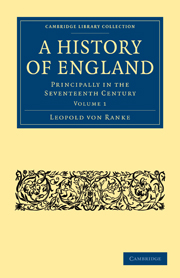Book contents
- Frontmatter
- PREFACE
- TRANSLATORS' PREFACE
- Contents
- BOOK I THE CHIEF CRISES IN THE EARLIER HISTORY OF ENGLAND
- INTRODUCTION
- CHAP. I The Britons, Romans, and Anglo-Saxons
- CHAP. II Transfer of the Anglo-Saxon crown to the Normans and Plantagenets
- CHAP. III The crown in conflict with Church and Nobles
- CHAP. IV Foundation of the Parliamentary Constitution
- CHAP. V Deposition of Richard II. The House of Lancaster
- BOOK II ATTEMPTS TO CONSOLIDATE THE KINGDOM INDEPENDENTLY IN ITS TEMPORAL AND SPIRITUAL RELATIONS
- BOOK III QUEEN ELIZABETH. CLOSE CONNEXION OF ENGLISH AND SCOTTISH AFFAIRS
- BOOK IV FOUNDATION OF THE KINGDOM OF GREAT BRITAIN. FIRST DISTURBANCES UNDER THE STUARTS
- BOOK V DISPUTES WITH PARLIAMENT DURING THE LATER YEARS OF THE REIGN OF JAMES I AND THE EARLIER YEARS OF THE REIGN OF CHARLES I
CHAP. IV - Foundation of the Parliamentary Constitution
Published online by Cambridge University Press: 07 June 2011
- Frontmatter
- PREFACE
- TRANSLATORS' PREFACE
- Contents
- BOOK I THE CHIEF CRISES IN THE EARLIER HISTORY OF ENGLAND
- INTRODUCTION
- CHAP. I The Britons, Romans, and Anglo-Saxons
- CHAP. II Transfer of the Anglo-Saxon crown to the Normans and Plantagenets
- CHAP. III The crown in conflict with Church and Nobles
- CHAP. IV Foundation of the Parliamentary Constitution
- CHAP. V Deposition of Richard II. The House of Lancaster
- BOOK II ATTEMPTS TO CONSOLIDATE THE KINGDOM INDEPENDENTLY IN ITS TEMPORAL AND SPIRITUAL RELATIONS
- BOOK III QUEEN ELIZABETH. CLOSE CONNEXION OF ENGLISH AND SCOTTISH AFFAIRS
- BOOK IV FOUNDATION OF THE KINGDOM OF GREAT BRITAIN. FIRST DISTURBANCES UNDER THE STUARTS
- BOOK V DISPUTES WITH PARLIAMENT DURING THE LATER YEARS OF THE REIGN OF JAMES I AND THE EARLIER YEARS OF THE REIGN OF CHARLES I
Summary
There is a very accurate correspondence in this epoch also between the general history of the Western world and events in England: these last form but a part of the great victory of the hierarchy and its advance in power, which marks the first half of the 13th century. By combining with the vassals the Popes had overcome the monarchy, and had then in turn overcome the vassals by combining with the monarchy and its endangered rights. It must not be regarded as a mere title, an empty word, if the Pope was acknowledged to be feudal Lord of England: his legates, Gualo, Pandulph, Otho, and with them some native prelates, devoted to him (above all that Peter des Roches, who, by his conduct when Bishop of Winchester, through the mistrust awakened, incurred almost the chief responsibility of the earlier troubles), spoke the decisive word in the affairs of the kingdom and crushed their opponents. It was reported that Innocent IV was heard to say, ‘Is not the King of England my vassal, my servant? At my nod he will imprison and punish.’ Under this influence the best benefices in the kingdom were given away without regard to the freedom of election or the rights of patrons, and in fact mostly to foreigners. The Pope's exchequer drew its richest revenues from England; there was no end to the exactions of its subordinate agents, Master Martin, Master Marin, Peter Rubeo, and all the rest of them. Even the King surrounded himself with foreigners.
- Type
- Chapter
- Information
- A History of EnglandPrincipally in the Seventeenth Century, pp. 58 - 73Publisher: Cambridge University PressPrint publication year: 2010First published in: 1875



